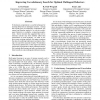Free Online Productivity Tools
i2Speak
i2Symbol
i2OCR
iTex2Img
iWeb2Print
iWeb2Shot
i2Type
iPdf2Split
iPdf2Merge
i2Bopomofo
i2Arabic
i2Style
i2Image
i2PDF
iLatex2Rtf
Sci2ools
115
click to vote
IJCAI
2003
2003
Improving Coevolutionary Search for Optimal Multiagent Behaviors
Evolutionary computation is a useful technique for learning behaviors in multiagent systems. Among the several types of evolutionary computation, one natural and popular method is to coevolve multiagent behaviors in multiple, cooperating populations. Recent research has suggested that coevolutionary systems may favor stability rather than performance in some domains. In order to improve upon existing methods, this paper examines the idea of modifying traditional coevolution, biasing it to search for maximal rewards. We introduce a theoretical justification of the improved method and present experiments in three problem domains. We conclude that biasing can help coevolution find better results in some multiagent problem domains.
Related Content
| Added | 31 Oct 2010 |
| Updated | 31 Oct 2010 |
| Type | Conference |
| Year | 2003 |
| Where | IJCAI |
| Authors | Liviu Panait, R. Paul Wiegand, Sean Luke |
Comments (0)

